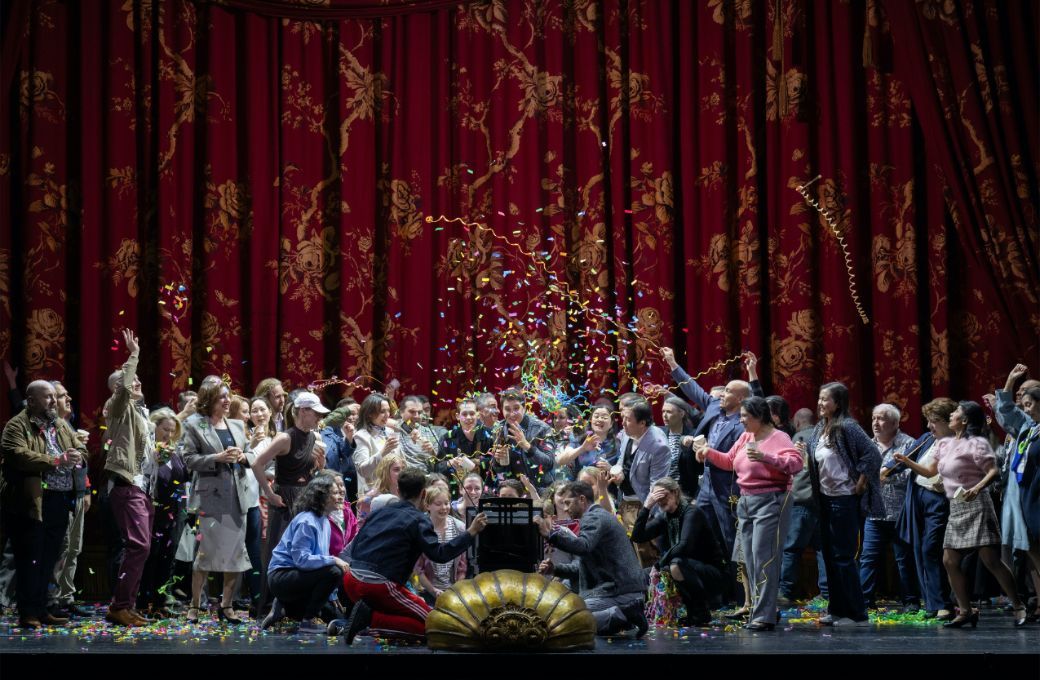The coming season at Zurich Opera and Ballet is a big one, marking the end of an era: the departure of intendant Andreas Homoki, who has presided over the house for 13 years. In that time Zurich has mounted a dizzying 123 new opera productions and 39 new ballets. The 2024–25 season is striking too, in demonstrating the house’s versatility, from Baroque opera, bel canto and verismo classics, oratorio, modern and contemporary opera, opera for children, contemporary and classical ballet.

The season comprises an impressive 11 new opera and 5 new dance productions, alongside a roughly equal number of revivals. From September, Homoki himself presents a new production of Ariadne auf Naxos, Strauss and Hoffmansthal’s strange seria-commedia mashup. But while self-aware, the opera is far from self-mocking. Strauss’ and Hoffmansthal’s tendency towards weightiness is mirrored too by Homoki’s other new directorial contribution this season, Mendelssohn’s Elijah (Elias), staged in June, with Christian Gerhaher in the title role. A bold choice to depart Zurich with an oratorio by a composer whose ambivalence towards opera was well known – maybe Homoki is proving he can do anything.
Meta-opera is also the watchword in Alfred Schnittke’s Life with an Idiot, which sees a major new production in November. Directed by Kirill Serebrennikov, who himself was subject to a Kafkaesque, years-long court prosecution in Russia. The director, who left Russia in 2022, would seem an ideal person to tackle Schnittke’s satirical and anarchic tale of Vova, the holy fool, indelibly capturing the freefall of the Soviet Union’s rapid collapse. Librettist and novelist Viktor Yerofeyev is also living in exile outside of Russia since 2022 – the opera retains an all-too-dystopian relevance.
This season at Zurich also sees two world premieres. The first, from November, is Around the World in 80 Days from Jonathan Dove, with a libretto by director Peter Lund. This piece is naturally aimed at all ages – with the story adapted to follow the young Max, who like the same-named hero of Where the Wild Things Are gets spirited away to far-off lands. This opera will be Dove’s 32nd music drama: a remarkable feat in an era which can sometimes seem averse to new opera.
In March, Zurich also stages a new opera by Swiss composer Beat Furrer, Das grosse Feuer, based on Eisejuaz, a classic of Argentinian literature by Sara Gallardo. The novel is a first-person narrative given by Eisejuaz, an indigenous, clairvoyant shaman whose traditional spiritual beliefs have fused with Christianity. Based on a real individual encountered by Gallardo when undertaking fieldwork in northern Argentina, the narrative has been transformed by Furrer and librettist Thomas Stangl into a large-scale choral opera. Furrer’s works delight in linguistic and psychological fragmentation, and Eisejuaz demonstrates an idiosyncratic holy Spanish (perhaps one reason this strange and extraordinary 1971 novel has not received an English translation).
Staying with new productions: December sees the Welsh director Adele Thomas return to Zurich after an acclaimed Il trovatore in 2021. Thomas is returning also to Verdi, directing Un ballo in maschera, with Charles Castronovo as King Gustavo, reprising the role sung at The Met in 2023. Barrie Kosky will also be making a return to Zurich this season with a new production of Manon Lescaut, a decade after he last directed Puccini in Zurich (2014’s production of La fanciulla del West). Elena Stikhina takes the title role – following on from her title role in Suor Angelica at DNO this May, also directed by Kosky.
Zurich also sees two Handel operas this season: the first, Serse, in December, a co-production with Theater Winterthur by Nina Russi, treats Handel’s opera seria as a modern telenovela. Then in March, Jetske Mijnssen directs a new Agrippina, together with Anna Bonitatibus in the title role, which she has previously sung to great praise.
Another major new opera production this season is Dmitri Tcherniakov’s Die tote Stadt, Korngold’s dark late-romantic work, completed in 1920 at the remarkable age of 23. Tcherniakov’s previous production in Zurich was a psychiatric take on Debussy’s Pelleas et Melisande, and Korngold’s Freudian melodrama may well be apposite for the director’s treatment. Tcherniakov will be joined by conductor Lorenzo Viotti (of DNO) and Vida Miknevičiũte and Eric Cutler in the lead roles.
Several new ballet productions are on offer in 2024–25 too. Artistic director and chief choreographer Cathy Marston, appointed last year, is adept at narrative ballet, and her new work Clara, based on the life of Clara Schumann, will premiere in October. The score, by longtime collaborator Philip Feeney, incorporates music by both Clara and Robert Schumann, together with Brahms, depicting these three intimately intertwined composers by interweaving their music. Marston’s Atonement, an adaptation of Ian McEwan’s novel, premiering in April 2024, will be presented again in June 2025. And Marston’s choreography can also be seen together in triple bills Countertime and The Butterfly Effect, the latter for Zurich’s junior ballet.
New productions of classic choreography are also on offer this season, with a triple bill of signature works by Crystal Pite, Wayne McGregor and William Forsythe receiving new stagings in March in Autographs. Kim Brandstrup’s Of Light, Wind and Waters, adapting material from Hans Christian Andersen, is another new production, on the boards in January. And in December, Patrice Bart’s Giselle, the most classic of classical ballets, will be staged in Zurich – partly in celebration of Bart’s 90th birthday in 2025.
In addition to these new productions, there are a cornucopia of revivals on stage at Zurich, too numerous to mention here – ranging from Mozart, Beethoven, Rossini, Donizetti, Verdi, Puccini to Wolfgang Rihm. But notably the season closes in June with a revival of Andreas Honoki’s staging of Salome, with Elena Stikhina in the title role, mirroring Strauss’ Ariadne which opened the season.
See all upcoming performances at Zurich Opera and Ballet.
This article was sponsored by Zurich Opera and Ballet.


